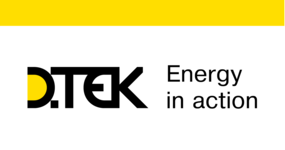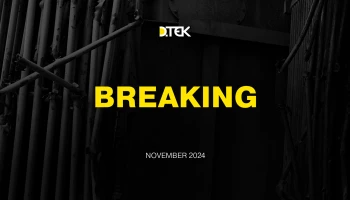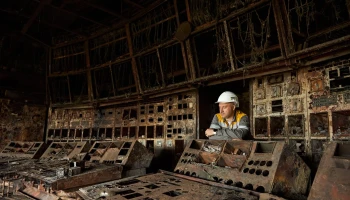Russia is concentrating its airstrikes on Ukraine's energy system. The electricity supplier DTEK is at the forefront of this theatre of war with its coal-fired power plants. Nevertheless, DTEK boss Maxim Timchenko is already planning for a green and nuclear future.
Mr Timchenko, according to your government, Russian troops have mined the Kakhovka dam in the Kherson region. Apart from the tidal wave, what would an explosion mean for Ukraine's energy supply?
The large hydropower plants operated by the state-owned company Ukrhydroenergo play a very important role in our system. Nuclear power provides the base load, hydropower for most of the flexibility. Aer what the Russians have been doing since the beginning of this invasion, I would not be surprised if they blow up this dam and cause another disaster. That would be a loss for Ukraine's entire energy system.
You took part in the recent G7 and bilateral talks in Berlin on Western support. Is Ukraine's energy sector getting what it needs?
To survive Russia's attacks on our energy system, we urgently need help – especially equipment. Moreover, the first steps towards reconstruction should be taken now, we should not wait until the end of the war.
This message has been heard in the EU. Is the EU acting accordingly?
We have good discussions with equipment manufacturers about how they can either find customers who can sell equipment already made for them. Or how they can supply us with systems stored or still in production.
Ukrainian companies and our Ministry of Energy are also talking to the European Commission and the Secretariat of the Energy Community. I hope that all this will have an immediate effect and that we will improve communication, for example to avoid having different lists of the equipment needed.
Has it been delivered?
The first deliveries were made to the transmission system operator Ukrenergo in recent weeks. Now we are hoping for equipment for ourselves, for our coal-fired power plants, which were a target of the Russian attacks. We are working around the clock to achieve this.
You know the speed of Russian attacks and your pace of repair. How long will the energy system last?
One of the most important questions is: How effective is our air defense?
We can talk a lot about the supply of equipment, but without a strong air defense, it will be very difficult to maintain operations. We work closely with the armed forces to give them a clear understanding of this critical infrastructure and the objects that need to be protected. We also build our own protection, for example from concrete barriers.
What are the tactics of the Russians in these attacks?
They are destroying the substations near the power plants, so far not so much the power plants themselves. Their tactic is to disconnect electricity generation from the grid. In this way, we cannot currently transfer evenly. In some regions we have an electricity surplus, in others a deficit.
What do you do when assets are destroyed?
An immediate solution may be to move undamaged equipment from one power plant to another. Five power plants were attacked, and we were able to reconnect four of them to the grid. Some systems can be restored within hours, others take days or in some cases even weeks. We are also looking to operators of coal-fired power plants, especially in Eastern Europe, for replacement plants in order to bring them to Ukraine as quickly as possible. But again, at the moment everything depends on air defense.
Ukraine's air defence is limited despite additional weapons systems from abroad. The energy sector seems to be Russia's most important target. Is he preferred in the deployment of these weapons?
This is difficult for me to comment on, because our armed forces set the priorities. But they are clearly aware of the importance of our infrastructure. They are destroying more and more missiles and drones aimed at it. But, of course, they can't hit everyone. Even if one or two get through, it means destruction.
What should Ukraine's energy system look like in a future after such attacks, after the war?
It's not about rebuilding it it's about designing it from scratch There is climate change, and there are new technologies. We believe that Ukraine can become a country with 100 percent clean energy – nuclear and green. Before the war began, our electricity mix consisted of 70 percent nuclear power and ten percent renewables. We have great potential for wind and solar energy and can become a green energy hub for European partners.
This would mean that coal and gas power would gradually be phased out. DTEK would then have to shut down most of its current production.
DTEK was founded in 2005 in Donetsk, it started as a mining and power generation company and is the largest coal producer in Ukraine. But we are committed to becoming carbon neutral by 2040. The war doesn't change that. Before the war, we had 1000 megawatts of wind and solar energy in operation and started building a 500 megawatt wind farm.
Unfortunately, half of our capacity today is in occupied territories. But I am confident that the 500-megawatt park will be completed. We want to become the largest Ukrainian producer of renewable energy for domestic consumption and export. We also want to replace coal with small modular nuclear reactors – SMRs – for which we can use the infrastructure of our coal-fired power plants.
Even after a positive outcome of the war for your country, you will have to deal with a Russia that can strike again. What does this mean for Ukraine's future energy supply?
That is why the decentralisation of our energy system is so important. We need to install renewables in many parts of the country. For flexibility, we need battery storage systems on an industrial scale. 18 months ago, we built our first battery storage system with a capacity of one megawatt.
Now we are developing a 20-megawatt unit – even under war conditions. We also need more interconnectors with the European transmission grid. In this way, our energy system can become greener and more resilient.
For baseload supply, however, you will continue to rely on central nuclear power plants.
I believe that these plants give Ukraine a great competitive advantage on the European market. We need to keep them working. At the same time, SMR technology should come to Ukraine. The nuclear industry has a long history – also a tragic history, but we have learned from it. Step by step, SMRs can replace the technology from Ukraine's Soviet past.
Conventional or SMR – both have the potential for disaster and are vulnerable to attacks by an unpredictable Russia. Doesn't that worry you?
Russia is not only a neighbour of Ukraine, but also a neighbour of Europe. 100 kilometers or 1000 kilometers don't make much difference when we talk about nuclear power. The Russians can attack other countries that operate nuclear reactors – Poland, Slovakia, Hungary... At the moment, the threat to Ukraine is greater, yes. But I hope that aer we win this war, Ukraine will be as safe as any other European country – in a resilient security landscape on this continent. One thing is obvious: without nuclear energy, we cannot talk about affordable electricity...
... says someone whose country experienced the Chernobyl disaster.
Today's nuclear technologies are much safer than those developed 50, 60 years ago. As I mentioned earlier, we are interested in SMR technology, we analyze its design. In terms of safety, it has the highest standards. SMRs are likely to be part of DTEK's long-term decarbonisation strategy. It will take years, but to be prepared, you have to start now. That is why I advise my colleagues in the European energy industry to take Ukraine seriously. In a sense, it is the country of Europe's energy future.
What advice would you give EU member states for their energy strategies?
Do not repeat mistakes like the Nord Stream pipelines. Europe should learn from its mistakes and not become dependent on one source of energy, especially such an unreliable one. Cheap gas from Russia is by no means cheap. You pay a high price, it's just a matter of time. Europe should be as self-sufficient as possible and pave the way for faster development – some of our renewable energy projects there have taken three times as long to develop as in Ukraine Europeans should be very careful in choosing their partners and diversify their hydrogen imports.
Ukraine should, of course, be part of the European energy security strategy.
The interview was conducted by Christian Schaudwet.






